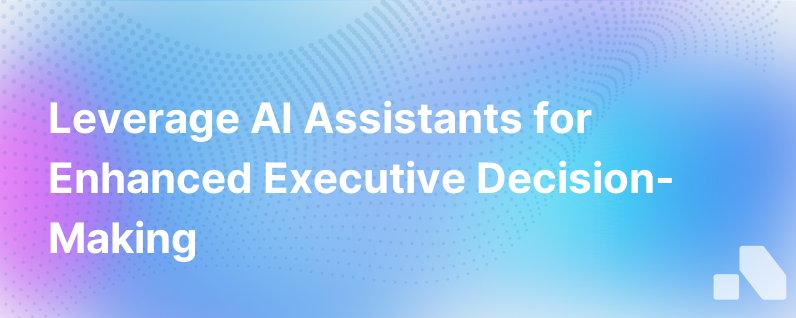
In the digital age, where the volume of data is burgeoning and the pace of business is accelerating, Artificial Intelligence (AI) has surged to the forefront as a critical asset for companies looking to carve out a competitive edge. Among the many applications of AI, perhaps none is more transformative than the AI Assistant—a sophisticated fusion of machine learning, natural language processing, and predictive analytics orchestrated to augment human capabilities.
An AI Assistant is not a purely theoretical concept or a distant promise of the future; it can be a tangible, everyday ally for businesses and individuals alike. It streamlines workflows, automates mundane tasks, personalizes interactions, and provides actionable insights, enabling users to focus on what they do best—innovation and strategic decision-making.
The Evolution of AI Assistants
Understanding the evolution of AI Assistants is crucial in appreciating their profound impact. The journey started with rule-based systems, simple bots programmed to perform specific tasks based on pre-defined commands. As technology evolved, so did these systems; entering the era of machine learning, where assistants can learn from interactions, adapt to user behaviors, and make sophisticated decisions based on complex datasets.
Today's AI Assistants are more than just reactive tools—they are proactive partners. They can anticipate needs, offer recommendations, and seamlessly integrate across platforms to provide a harmonious user experience. With the power of deep learning, context-aware computing, and emotional intelligence, AI Assistants are becoming more intuitive and indispensable than ever.
The Power of AI in the Workplace
In the workplace, AI Assistants are revolutionizing business operations. They help manage calendars, sort emails, prioritize tasks, and even take notes during meetings, transcribing conversations and highlighting action points. Consider the impact of an AI Assistant on customer service; assistants can engage customers 24/7, providing instant support, routing queries to the right department, and personalizing responses based on the customer's history and preferences.
For sales and marketing professionals, AI Assistants are invaluable for lead generation and nurturing. They can identify and qualify leads, schedule follow-ups, and arm sales personnel with relevant data points and insights to close deals more effectively. Behind the scenes, AI Assistants aid in data analysis, extracting patterns and trends from large datasets, empowering organizations to make data-driven decisions.
AI Assistant in B2B Sales: Meet Aomni
In the realm of B2B sales, where the sale cycles are longer and more complex, AI Assistants prove especially transformative. Take, for example, a platform like Aomni. Aomni leverages AI to deliver tools that enable sales teams to sell more strategically. It offers real-time account research, actionable competitive insights, and personalized sales content—all within 15 minutes, requiring zero manual effort from the user.
This AI-driven approach translates into significant time savings and increased efficiency for sales teams. With AI handling research and data analysis, sales professionals can focus more on relationship-building and crafting strategies tailored to each prospect's unique needs and pain points.
AI Assistants and Personalization
The ability of AI Assistants to deliver personalized experiences is one of their most potent attributes. By sifting through customer data and learning from historical interactions, AI can create a customized journey for each individual. This level of individualized attention was once reserved for VIP treatment but is now scalable to the entire customer base, thanks to AI Assistants.
Online retailers, for example, use AI Assistants to recommend products based on past purchases, current browsing behavior, and even what similar customers have bought. In a B2B context, personalization might involve tailoring communication to reflect a prospect’s industry challenges or providing customized reports and insights that resonate with their specific business situation.
The Future Outlook of AI Assistants
The potential future applications of AI Assistants are boundless, limited only by the imagination and the advancements in AI. AI Assistants will continue to evolve, growing smarter and more intuitive, integrating more deeply with the tools we use, and understanding the nuances of human emotion and communication. They will likely become central in driving customer experiences, developing strategies, managing complex projects, and even predicting market trends before they unfold.
In industries like healthcare, AI Assistants could aid in diagnosing patients or monitoring their health. In finance, they could automate trading strategies or manage personal finances. Across every sector, the AI Assistant stands to become a personalized consultant, strategist, and trusted ally.
Challenges and Ethical Considerations
While the growth trajectory for AI is steep, it does come with challenges. The ethical implications of AI, including privacy concerns, data security, and the potential for biased decision-making, are topics that require thoughtful and ongoing consideration. In addition, there is the matter of the human-AI interface—ensuring that these powerful tools remain just that: tools that enhance human capabilities without replacing the need for human judgment and empathy.
In Conclusion
The AI Assistant's evolution signifies a radical shift in how we interact with technology and data. No longer confined to the realms of administrative support, AI Assistants now influence strategic business areas with their ability to analyze, predict, and personalize at scale. It is essential, however, to wield this powerful tool thoughtfully, ensuring that as we embrace the conveniences and efficiencies it offers, we continue to prioritize the human elements that define the essence of our businesses.
Looking ahead, AI Assistants will continue to redefine efficiency and productivity landscapes. As we further integrate these assistants into our daily operations, we scale not only our businesses but also our ability to innovate and lead in an ever-evolving digital frontier.